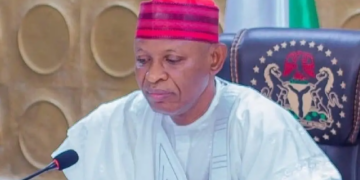If there’s one thing President Bola Tinubu’s first media chat revealed, it’s that the man has mastered the art of doubling down. “I have no regrets whatever removing subsidies,” he declared, with the conviction of someone who believes he is steering the ship in the right direction despite turbulent waters.
My thoughts on this? I think the President’s steadfast defence of his economic policies shows both courage and a keen understanding that transformative changes rarely come without pain. The reduction in debt service ratio from 98 percent to 68 percent is actually a remarkable achievement in such a short time, even though it doesn’t make immediate headlines like fuel prices do.
To be sure, Tinubu makes valid points about subsidy removal being necessary. The old system was indeed like a leaky bucket trying to hold water, benefitting smugglers more than ordinary Nigerians. The President’s determination to tackle this decades-old problem head-on, despite its political costs, demonstrates a refreshing departure from the kick-the-can-down-the-road approach of previous administrations
However, here’s where it gets interesting – the President speaks about protecting our children’s future while parents currently struggle to feed their children in the present. It’s a delicate balance between long-term reform and immediate survival needs, and the administration needs to find better ways to cushion the impact.
The President’s comments about the recent deadly food stampedes were particularly revealing. His reference to his 25-year history of organised charity distribution felt somewhat tone-deaf, though it does highlight his long-standing commitment to philanthropy. Still, these tragic incidents call for more systematic solutions rather than reliance on charitable distributions.
The tax reforms discussion showcased Tinubu’s vision for a modern Nigeria. “We cannot retool this economy with the old broken pot,” he said, emphasising the need for comprehensive reforms. His focus on widening the tax net rather than burdening existing taxpayers shows strategic thinking. The resistance from northern governors isn’t just about regional politics – it’s about timing and implementation, requiring careful negotiation and consensus-building.
One positive development is the administration’s approach to fiscal management. Exiting the previous “ways and means” model and implementing stricter financial controls demonstrates a commitment to fiscal discipline that Nigeria desperately needs. The improved revenue generation and distribution system, coupled with local government autonomy, could potentially transform grassroots development.
I found it particularly interesting that Tinubu defended his cabinet amid calls for reshuffling. While public opinion might be mixed, stability in governance can be beneficial during major reform periods. The real test will be whether this team can effectively implement the President’s vision for economic transformation.
The President’s stance on corruption showed practical wisdom: “Pay them good and living wages. I increased the minimum wage, and to me, that is fighting corruption.” It’s a valid point – addressing the root causes of corruption through better wages and social services could be more effective than purely punitive measures. The increase in minimum wage, despite the economic challenges, demonstrates a commitment to workers’ welfare.
Tinubu’s free market stance remains consistent: “I don’t believe in price control. It’s a question of supply and demand.” This market-oriented approach, combined with promised agricultural reforms including 2,000 new tractors, could potentially revolutionise Nigeria’s farming sector and address food security challenges. The focus on mechanised farming shows forward thinking, though implementation will be crucial.
The improvements in security, particularly in making previously dangerous routes safer for travel, deserve recognition. “Two decades of wanton killings have been addressed,” the President claimed, and while challenges remain, there has been notable progress in several areas.
Perhaps the most significant takeaway was Tinubu’s acknowledgment that “we cannot finish the job in one calendar year.” This honest assessment, combined with his promise of a “glorious dawn” in 2025, shows both realism and optimism. The reduction in debt service ratio and exit from ways and means financing are technical achievements that could lay the groundwork for sustainable economic growth.
As we look toward 2025, the administration faces the monumental task of balancing long-term reforms with immediate relief measures. The President’s conviction is admirable, and some of his policies show promising results.
However, the success of his bold economic vision will ultimately depend on how well his team can manage the transition period and provide adequate support to struggling Nigerians.
His closing statement seeking understanding while acknowledging the people’s troubles struck the right note: “I seek your understanding, I understand the trouble you’ve been through… Let’s believe in ourselves and in our country, tomorrow will bring a glorious dawn.”
The challenge now is turning these words into tangible improvements in Nigerian lives.
For now, the jury remains out on whether Tinubu’s medicine, though bitter, will ultimately cure the patient. But one thing is certain – he’s shown he’s willing to make tough decisions and stand by them, for better or worse. The coming year will be crucial in determining whether his bold economic gamble pays off for Nigeria’s future.











